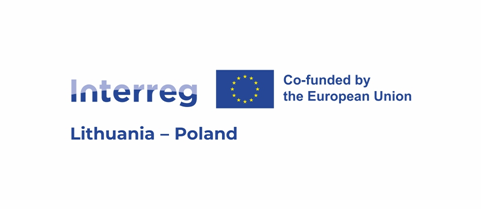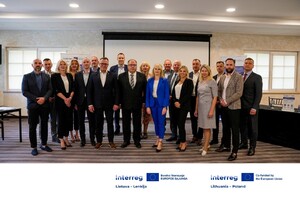W dniach 28-29.08.2025 r. na terytorium Litwy w m. Prienu odbyła się konferencja rozpoczynajaca projekt LTPL00371 ,,Joint initiatives to strengthen Lithuanian and Polish border protection’’ realizowanego w ramach Programu Współpracy Litwa - Polska Interreg VI-A.
Spotkanie rozpoczęło się od oficjalnych przemówień przedstawicieli Lidera Projektu oraz partnerów. Następnie, przedstawiciel Lidera Projektu - Neringa Kačinskienė, analityk ds. jakości szkoleń, przedstawiła krótko ogólny cel projektu, pakiety zadań, działania, produkty końcowe oraz oczekiwane rezultaty projektu. Następnie przedstawiciel Warmińsko-Mazurskiego Oddziału SG przedstawił prezentację nt. wyzwań związanych z realizacją zadań na odcinku służbowej odpowiedzialności Oddziału.
Kolejnymi elementami programu spotkania były prezentacje zaproszonych gości tj. kierownik ds. bezpieczeństwa cybernetycznego i informacyjnego, Litewski Centrum Radiowo-Telewizyjny - Grigorija Strelec na temat zagrożeń w obszarze cyberbezpieczeństwa oraz eksperta ds. oceny i analizy zagrożeń hybrydowych z Ministerstwa Obrony Narodowej Republiki Litewskiej - Tomasa Čeponisa na temat zagrożeń o charakterze hybrydowym.
Następnie odbyła się dyskusja moderowana przez dziennikarkę telewizyjną Daivę Žeimytė – Bilienė, której tematyka nawiązywała do wygłoszonych prezentacji.
„Zwiększając zasięg lotów obecnych bezzałogowych statków powietrznych i usuwając przeszkody, będziemy mogli monitorować terytorium aż do Polski i wymieniać informacje z partnerami. Zapewni to szybsze monitorowanie sytuacji krytycznych oraz skuteczniejsze i skoordynowane reagowanie” – mówi kierownik projektu i szef Wydziału Organizacji Kontroli Granicznej Państwowej Służby Ochrony Granic Vytautas Ulevičius.
Partner projektu, Zastępca Komendanta Straży Granicznej w Białymstoku, płk SG Marek Sochański, podkreślił, że wspólne działania i szkolenia pomogą zapewnić nie tylko bezpieczeństwo granic, ale także płynny przepływ obywateli w strefie Schengen.
📌 Projekt jest częściowo finansowany w ramach programu współpracy między Litwą a Polską „Interreg VI-A” i potrwa do 2027 r.

On 28-29 August 2025, a conference was in Prienai, Lithuania, to launch the LTPL00371 project, ‘Joint initiatives to strengthen Lithuanian and Polish border protection,’ implemented under the Lithuania-Poland Interreg VI-A Cooperation Programme.
The meeting began with official speeches by representatives of the Project Leader and partners. Next, the representative of the Project Leader, Neringa Kačinskienė, training quality analyst, briefly presented the overall objective of the project, task packages, activities, final products and expected results of the project. Next, a representative of the Warmian-Masurian Branch of the Border Guard gave a presentation on the challenges associated with the implementation of tasks within the Branch's area of responsibility.
The next items on the meeting agenda were presentations by invited guests, i.e. the cyber and information security manager, Lithuanian Radio and Television Centre - Grigorija Strelec on threats in the area of cyber security, and the expert on the assessment and analysis of hybrid threats from the Ministry of National Defence of the Republic of Lithuania - Tomas Čeponis on hybrid threats.
This was followed by a discussion moderated by television journalist Daiva Žeimytė-Bilienė, which referred to the topics of the presentations.
"By increasing the range of current unmanned aerial vehicles and removing obstacles, we will be able to monitor the territory up to Poland and exchange information with our partners. This will ensure faster monitoring of critical situations and a more effective and coordinated response," says project manager and head of the Border Control Organisation Department of the State Border Guard Service, Vytautas Ulevičius.
The project partner, Deputy Commander of the Border Guard in Białystok, Colonel Marek Sochański, emphasised that joint activities and training will help to ensure not only border security but also the smooth flow of citizens within the Schengen area.
📌 The project is partly funded under the Lithuania-Poland cooperation programme ‘Interreg VI-A’ and will run until 2027.

